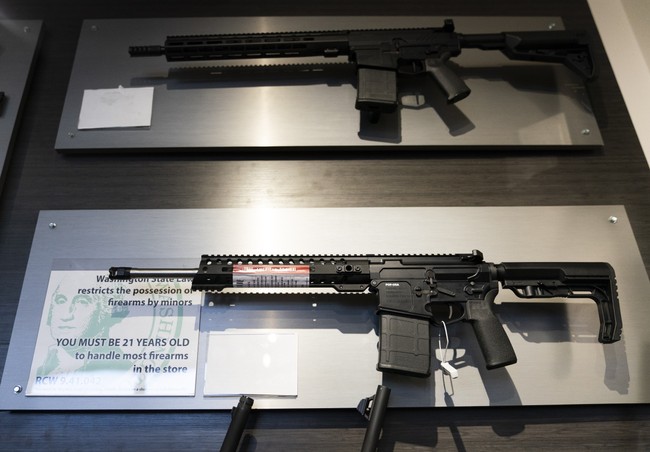
A federal judge in Kansas on Wednesday ruled in favor of a defendant charged with offense related to owning machine guns.
U.S. District Judge John W. Broomes in Wichita dismissed two machine gun charges against Tamori Morgan, who was indicted in 2023 for possessing a model AM-15 .300 caliber machine gun and a conversion device known as a “Glock switch” that can make a semi-automatic weapon fire at a similar rate to machine guns.
During trial, Morgan’s lawyers argued that these firearms are protected under the Second Amendment, a claim that Broomes upheld. He ruled that machine guns qualify as “bearable arms” under the Second Amendment and that the state failed to demonstrate a historical precedent that justifies the regulation of these weapons.
The Supreme Court’s ruling in New York Rifle & Pistol Association v. Bruen now requires gun laws to be in line with historical precedents to remain in place. The court’s decision has led to the striking down of several anti-gun laws. “The weapons at issue in this case are bearable arms that, under Bruen’s first step, are covered by the plain text of the Second Amendment,” Broomes wrote in his ruling.
🚨 Kansas District Court dismissed a machine gun possession charge yesterday.
The court argues that machine guns are protected by the 2A. pic.twitter.com/po4flardS9
— National Association for Gun Rights (@NatlGunRights) August 22, 2024
The judge also noted that the government “has not met its burden under Bruen and Rahimi to demonstrate through historical analogs that regulation of the weapons at issue in this case are consistent with the nation’s history of firearms regulation.”
Broomes also rejected the state’s historical examples, noting that they were both “disanalogous to what Defendant is charged with here—simple possession of a machine gun.” The judge further highlighted that 18 § 922(o), a section of the United States Code making it unlawful for any person to transfer or possess a machine gun with specific exceptions, “says nothing about the manner in which machine guns are carried or displayed.”
Judge Broomes’ ruling could have significant implications for how machine gun regulations are viewed under the Second Amendment, especially in light of the Bruen decision. It could lead to more challenges against longstanding federal laws, especially if it is upheld in the appeals court.
This ruling could have significant implications for how machine gun regulations are viewed under the Second Amendment, potentially challenging longstanding federal laws depending on future appeals and court decisions.
Under current policy, it is possible for an individual to legally own a fully automatic firearm. However, the process to do so is complex and highly regulated.
First, the gun must have been legally manufactured and registered before May 19, 1986, as mandated by the Firearm Owners’ Protection Act. Before purchasing the weapon, one must first apply through the Bureau of Alcohol, Tobacco, Firearms, and Explosives (ATF). This involves an extensive background check, submitting fingerprints and a photograph, and paying a $200 tax stamp for the transfer.
Those seeking to own a machine gun also require approval from local law enforcement, which can take several months. Once the individual is approved, they must comply with all state and federal laws related to storage and use.
Some expect the ruling to be overturned in a higher court. “As far as I know, this is the first time in American history that a machine gun ban has been found unconstitutional in its application,” Eric Ruben, a fellow at the Brennan Center and an associate law professor at Southern Methodist University, told The Associated Press.
Janet Carter, senior director of issues and appeals at Everytown Law, a leading anti-gun organization, criticized Broomes’ decision, saying it is “appalling that the District Court would so brazenly put the deadly agenda of the gun lobby over the safety of Kansans.”
“Machine guns – guns capable of automatic firing – have been tightly regulated under federal law since the 1930s. The laws banning them are not only constitutional but crucial to public safety. These weapons of war, capable of causing irreparable harm to countless innocent people, have no place in our communities,” she added.

